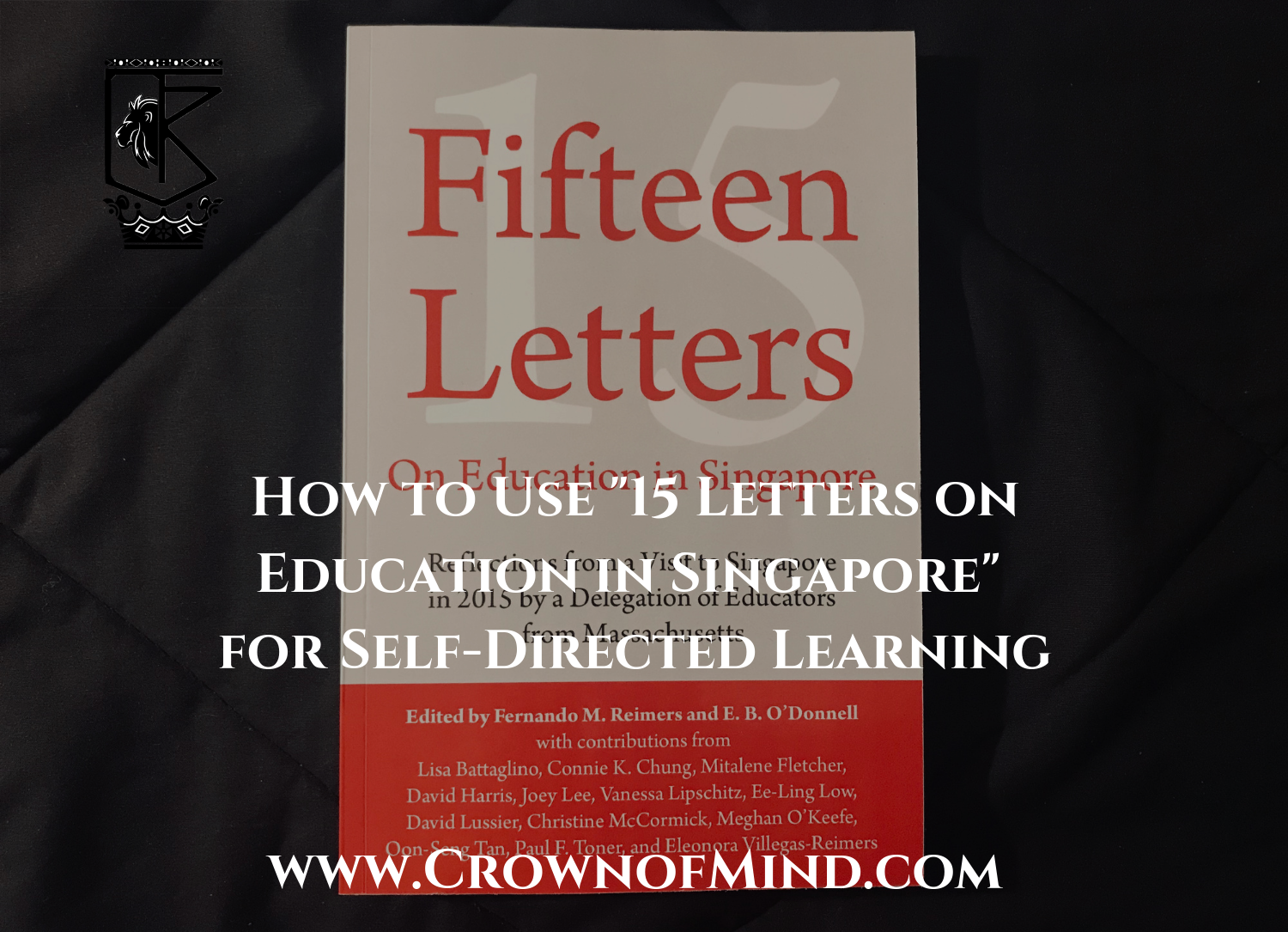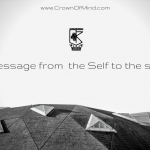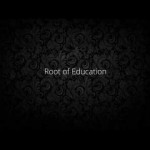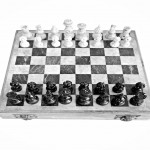Fifteen Letters on Education in Singapore showed up as I was browsing Audible for new books; had a few additional credits to use. After reading the summary, I decided to order the paperback instead of audio so that I could notate near the words on the page. There are just some titles I prefer to have as a physical copy over E-version or audio, those that I sense I’ll be returning to several times and want the efficient access.
This brings up a point I think is important for readers here: build a physical book collection in addition to the digital counterparts. In our current society here in the U.S., we have digital abundance which allows for quick knowledge accumulation on devices. The beauty is in how fast a multitude of articles, website content, blogs and books can be saved on devices about the size of a finger’s pad. For posterity and traveling purposes, this appears practical to me. But I caution about the sole reliance on these devices to house your knowledge. Digital counterparts house the potential for easier manipulation, content changed, altered, edited, removed and there is always the potential for technology to “go down,” or fall offline.
Recall the sudden Google downtime last week, which I personally experienced while working on file management, clearing inboxes. A mere 4-5 hours of downtime cut Vimeo, YouTube, most Google applications and other integrations associated with them. The reports about connectivity issues numbered in the thousands; people’s activities were inhibited just by this occurring. So imagine if there was a longer-term societal outage that challenged the public to live without Internet (or digital in general) access. What would people do? How would knowledge continue to be accessed? Your physical books.
Singapore is a Model
15 Letters incorporates perspectives from fifteen Massachusetts educators who traveled to Singapore to learn about their educational approach. Singapore is a model observed for its rapid transformation in less than 50 years. Since 1965 and Lee Kuan Yew as the first prime minister, the nation evolved from a former British-influenced land into a high-tech, independent, top educational hub with the 3rd ranked GPD per capita in the world. It’s also one of the few nations I’ve seen that places character strengths as part of its education model for the 21st century.
There are several factors contributing to this swift transformation but the most acute, and widely acknowledged element is educational investment. The nation’s leadership understands that education is foundational to all manifestations in a society; the more educated citizens are, the higher the quality of their choices in that society, thus producing higher-level manifestations. Educators are also revered in Singapore, viewed on par with and paid along the same salary tiers as engineers. Contrast this with our current U.S. philosophies on education, investing in this space and educator treatment and compensation.
The Massachusetts educators observed consistencies from their experiences in Singapore and decided to write individual letters based on them. I recommend reading the book to explore their ideas in greater detail. What I will do here is extract the book’s core and apply it to the self-directed learning skill MasterLearn is based on.
When you read and receive valuable knowledge, ask yourself, “How can I apply this directly in my life?” As you accumulate more knowledge, you will discover patterns and the underlying principles existing in the sources. These principles can be internalized and harnessed in your own curriculum.
In 15 letters, there are four qualities visible throughout Singapore’s educational approach:
- Clear & Bold Vision
- Commitment to Implementation
- Coherence
- Capacity
What you can do is use these same principles for yourself. Let’s go through each.
Clear & Bold Vision
What’s your educational philosophy? Do you have one right now?
Think about what it could be outside of what you’ve been told in the past, that you can only gain your education sitting in a chair in a large building in several classrooms. Or that the idea of “school” only exists in the formal way we’ve come to know it. Or that learning takes place only in that school format.
When we broaden this view and incorporate metaphysics, we recognize that our mere living is a type of school, full of lessons and challenges, examinations and potential for graduations to greater consciousness levels. When the world is your classroom, the people you do and don’t engage with are your classmates and there are tests and study required, your educational philosophy also evolves.
Write down your personal clear and bold vision. What does education in your self-directed system look like? Clarity means specific; it’s important for you to give examples of what this looks like. Place yourself in that environment so you can mentally live it.
Commitment to Implementation
Implementation can be done without commitment but it will manifest weakly meaning….inconsistently. Once you have your vision set, and it’s clear, write down your hows: when will you focus on your system, for how long, what days, what will you cover on which days, how will you challenge yourself, how will you test yourself, how will you know you’ve done well?
This stage is about performance tracking. For example, if you designed your system to include a reflection day, then on that day you won’t create anything new, only ponder about the knowledge you’ve decided to focus on. Perhaps you’ll write down inspirations that come to mind but you won’t act on them. Perhaps you’ll take a walk that day to think. Maybe you’ll consider ideas that deliberately counter the knowledge you’ve gained.
Metaphysically, you would also consider the knowledge’s effect on your emotions, mental states and what is showing up in your life. How has your perception changed since receiving this knowledge? What mental models have you destroyed or integrated due to this knowledge?
Commitment is about making this work a priority. You will be challenged the moment you decide this is a must-do and not just a could-do. The resistance, as a natural effect of the mental physics you’re taking action with, will find ways to tempt you to reduce your work’s importance. Be vigilant and observe these tests, as that’s what they are. Welcome them as allies helping you to sharpen, increase self-discipline.
Coherence
In Singapore, all of the nation’s stakeholders are clear, committed and recognize an almost-memorized vision about education and where their work should be taking the country. This unification enables them to acquire and utilize resources with near-singular focus; it’s a positive pendulum swing of what we tend to call group think. In this version, the group is thinking about the same positive end: to produce highly educated, highly capable, high-character based citizens. Why would any organization be opposed to this unless the goal is to produce its opposite? Excessive group think and excessive individuality can produce negative consequences.
We know what the group think can do but talk less about the individuality. When carried to excess, the individual acts only in self-interest to the detriment of other stakeholders. These “holders” also include nature aspects such as the animals, the land, forestry, the atmosphere and other people. In excess, we can take individualistic tendencies to a level that simply says, “I’m going to do what I want to do and could care less about the consequences.”
As we become wiser, we become skillful at living optimally in our self-interest and support the growth of what’s around us.
For self-directed learning, coherence means to fuse all of your life’s efforts towards your bold and clear vision. This topic can be sensitive for some, because it inevitably requires some sacrifice.
The moment you choose your vision, you’ve collapsed in your mind a particular timeline.
To reach that timeline is to make choices supporting it.
This means you are making choices to also not choose other timelines.
This means you’re trading, or sacrificing one to attain another.
What are you willing to give up to commit to your learning? Are you ensuring all of your energies are supporting the vision?
Capacity
Capacity for Singapore has double meaning, there two investments made and could be related to the chicken and the egg: which came first?
The first investment is in the educators; by treating them with high esteem, the profession as a role model, paying them well and supporting their career development, these educators refine to elite levels and perform to this standard.
The effect becomes the next investment, the elite performance adding value to the students, who receive immense support in their educational process (almost to pressured degrees as you’ll see in some cases from the book). These students cultivate under the rigorous environment, who then become the future outgrowth from the vision, who then innovate and add value within the nation. Capacities continue to evolve through this process.
For your self-learning model, you develop capacities by investing in yourself: nutrition, physical education, mental cultivation, character strength, learning the spiritual laws, being willing to give up that which does not support your holistic development. These are investments.
The outgrowth of your work becomes similar to what Singapore’s accomplished. In your own life: innovation, opportunities, insight, fulfillment, social growth, career development, creation, talent emergence.
In a world where information is in abundance like today, your art of learning will become increasingly in demand and essential. Let this book on Singapore be one tool to assist.










